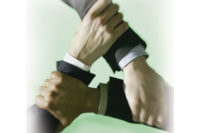"So many people are going out into consulting and falling flat on their faces," he says. "They think they can get $110 an hour, but it's not so." One example: A "safety professional of the year" winner who Colvin says "starved" as a consultant a year after leaving his company. "He couldn't get the business."
Nine out of ten people who try to set up their own safety and health consulting business fail, estimates Colvin. Why? With many pros thinking about giving it a try, we thought we'd talk to Colvin about the culture shock of moving into consulting. He has 38 years of experience in safety, and has been in consulting since the 1970s. A congenial New Englander now living outside of Houston, Colvin and his wife Rosemary are principals of Safety Training Dynamics, Inc.
(By the way, this is the first in a regular series of articles on consulting. If you're interested in contributing as a columnist, call us at 610-964-4057; fax 610-964-4647.)
The real deal
First, several myths about consulting should be discarded by anyone thinking about getting into the business on their own. One has to do with the amount of money that can be made.Safety and health pros from Fortune 500 companies recall paying industrial hygienists $100 or more an hour and get the feeling "I could do that; I've got the same credentials he's got," says Colvin. Not so fast. Success in consulting is 90 percent sales and marketing, ten percent technical expertise, he says. Even at that, the "best salesman in the world" can't just hang out a shingle, claim he's a safety and health consultant, and make it, says Colvin.
You've got to have a niche and a plan. "Without this, you're doomed to fail," he says. "People don't realize this is an entire lifestyle" they are committing to, he adds.
Which leads to the second myth, the old one about the glamour of being your own boss, setting your own hours. "Consulting is more than being the expert in the three-piece suit with the briefcase. People don't see me schlepping brochures to the printer and the post office. They don't see the grunt work; they don't get a good perspective on what we do," says Colvin.
That's because consultants, being salespeople, accentuate the positive and downplay the negative. "We don't tell about the times we didn't get the business," says Colvin. "When someone thinks back to the big bucks a consultant made at their company, they don't know that it could've been the guy's only job for the year."
Don't get into consulting thinking you'll have your pick of clients. Colvin says the business is much more competitive today than in the early days of OSHA, when companies were looking for help with fewer consultants to choose from.
"You work 24 hours a day, seven days a week if you're conscientious about what you're doing- and you can't really succeed unless you are conscientious," says Colvin. "You're always on the phone, whether you're traveling or on vacation, because there's always potential business you could miss if you don't stay in touch."
One of the keys to making it in consulting is plain hard work. "You've got to put in the time," says Colvin. "There's no question about it, there's a direct relation between effort and success."
Another determining factor is planning. Colvin knew early on in his career that he eventually wanted to be out on his own. He started planning when he was 30 years old. He networked, made a name for himself writing books (publishing the first one himself) and getting on association boards. "I positioned myself," he says. Before taking an early retirement from Polaroid Corporation, he also had a business plan, a financial plan, and a personal satisfaction plan.
"It's not all about making money," he explains.
Part of positioning yourself is knowing who you are, your strengths and weaknesses, says Colvin. "Before breaking that umbilical cord with Big Daddy (your employer), you need to know what you can and can't deliver on your own," he says.
And don't expect clients to deliver more than they can, in terms of resources for your recommendations. Colvin recalls one very well-credentialed safety and health professional who left his "Fortune 5" company only to fail as a consultant because he expected clients to have unlimited budgets.
"All he could do was refer back to his own experience," he explains. "You've got to work with your clients, understanding their resources."
To help safety and health pros understand the consulting business, Colvin and his wife are beginning a two-day course on "Consulting Techniques for Technical People." It's being run under the auspices of the Colvins' Professional Technical Consulting Institute of North America, and Colvin sees it as a forerunner to a consulting certification program. For information call: (713) 298-SAFE.




